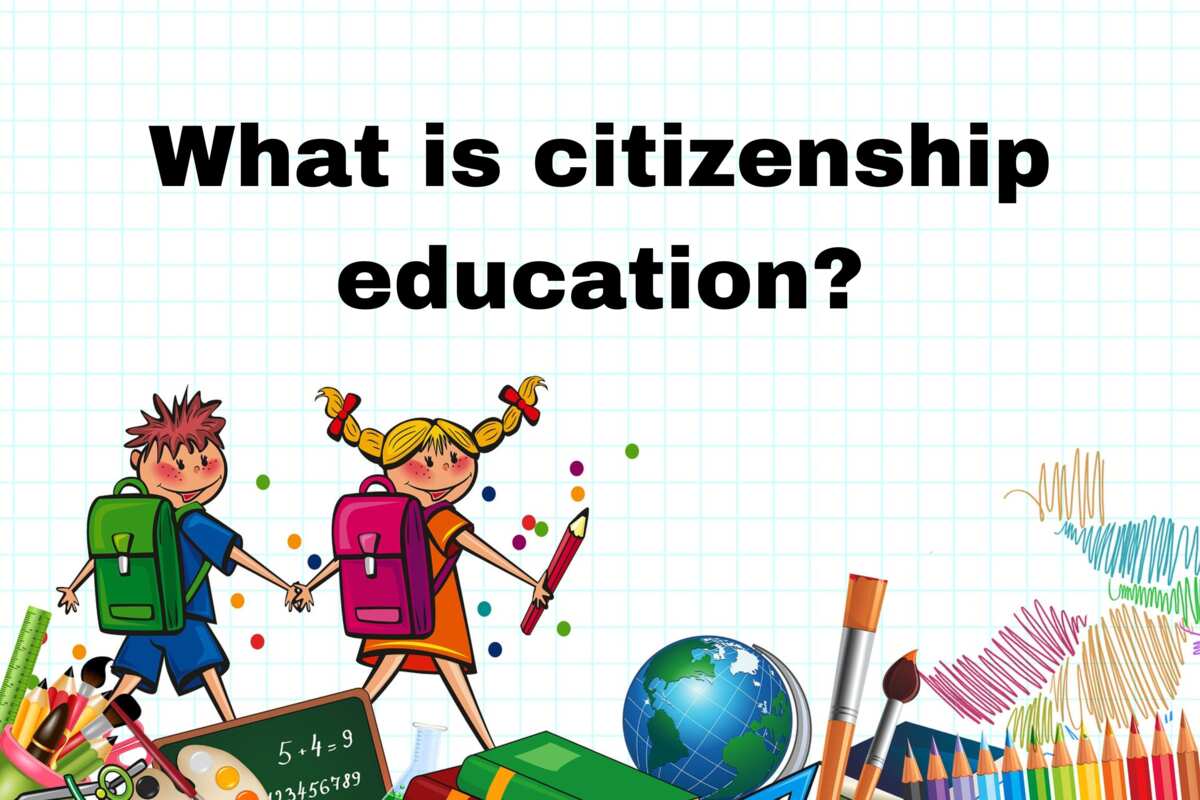What is the meaning of civic education? It is a public, socially-oriented system of continuous education and upbringing aimed at building civic competence, democratic culture, and satisfying the needs for socialization in the interests of the individual, civil society and the rule of law. Let us find out its importance in modern Nigerian society.

What are the main objectives of civic education? Read on to find out.
What is civic education?
Apart from the definition above, civic education can also be defined as the provision of information and learning experiences to equip and empower citizens to participate in democratic processes.
Main goals of civic education
The main goal of civic education can be considered as the formation of civil qualities on the basis of new knowledge, skills and values that help individuals to solve emerging problems, adapt to changing socio-economic and political conditions, represent and protect their rights and interests, respecting the interests and rights of others.

Read also
What is non formal education? Methods, definition, types?
What are the components of civic education?
The main components of civic education are:

The major groups in the society that civic education is largely targeted at and focused on can be identified as:
- schoolchildren and students;
- teachers;
- military and security forces;
- state and municipal employees;
- NGO activists;
- prisoners and other risk groups;
- pensioners and older people.
What is civic education and its importance in Nigeria
What is the importance of civic education in Nigerian schools? The main task of civic education is the preparation of children for the future, the task of educating future citizens of our country. Many teachers sincerely wishing for the democratic development of Nigeria have been making efforts both to introduce school subjects that will help the young ones develop self-management and other life skills that will help prepare them for the future.

Read also
Discover the 5 functions of civil society in Nigeria

Why do we study civic education?
The purpose of each state civic program should be the creation of an effective system of ethical and legal education that would contribute to:
- the formation and development of humanistic personal orientations;
- the formation of legal and political culture among schoolchildren;
- the development of their democratic way of thinking and the acquisition of a complex ethical, legal and political knowledge, skills and abilities and the experience that young people need to integrate into a democratic society, for their active participation in the social life of the country and the protection of the rule of law.
Implementation of this system must be facilitated by the creation of a holistic educational and methodical complex.
Today, the following components of the system of civic education in the school are distinguished:

Work in this direction is actively supported by the Council of Europe, whose tasks include educating the younger generation towards democratic citizenship based on the priority of human rights.

Read also
Community development: definition, approaches and types
This work is connected with the education of the teachers themselves, that's why a whole network of groups of teachers is gradually being created in our country, including those that work in the system of retraining secondary school teachers.

Let us put forward the idea of creating a non-governmental, non-profit public-pedagogical association that would unite all those interested in the development of civic education in Nigeria. The main objectives of such an association should be:

Read also
Top primary values and principles of constitutional democracy
If such an association would be created in Nigeria, it should promote the development of democratic processes in school education, primarily by creating a democratic lifestyle in schools and disseminating this experience in other schools.
Surely, there are more target groups than only pupils and teachers. But let’s not forget that this audience will show much more will in their study, so the effectiveness of civic education in such a case would be much higher because it is easier to raise a democratic people than trying to break the entrenched rules of previous generations.
Frequently Asked Questions

In this section, we answer some of the most commonly asked questions on this topic.
1. What is orderliness in civic education?
Orderliness is the quality or habit of appreciating and systematic way with the aim of achieving set goals. It is the condition where things follow laid down procedures or are properly arranged.

Read also
How to solve the problem of cultural diversity in Nigeria
Six ways of exhibiting orderliness in the society include:
- Decorum in habits, relations, actions, programs at the bus stop.
- Queuing culture by obeying rules that promote orderliness like queuing at the ATM points.
- Obeying traffic regulations or rules when driving.
- Listening skills and politeness in the public.
- Tolerance of oppositions i.e, tolerating opposing views, religions and social critics.
- Due process and justice; allowing thing to follow their proper order.
2. What is cultism in civic education?
Cultism is a form of organization whose activities are not only exclusively kept away from the knowledge of others but such activities are carried out at odd hours of the day and they often clash with the accepted norms and values of everyday life.
3. What is value in civic education?
Value is the esteemed quality in which a person attaches to certain ideas, beliefs or principles.
Positive values include gratitude, truth-telling, hard work, and obedience while examples of negative values are anger, pride, laziness, discrimination, lust, and gluttony.

Read also
Advantages and disadvantages of democracy
4. What are civic dispositions?
Civic dispositions are defined as the citizen traits necessary for democracy (e.g. tolerance, public-spiritedness, civility, critical mindedness and willingness to listen, negotiate, and compromise).
5. What are civic skills?
Civic skills refer to citizens’ ability to analyze, evaluate, take and defend positions on public issues, and to use their knowledge to participate in civic and political processes (e.g. to monitor government performance, or mobilize other citizens around particular issues).
7. What are the promising approaches to civic education?
For this type of learning to be effective, schools should do the following:
- Encourage student participation in school governance.
- Provide instruction in government, history, law, and democracy.
- Incorporate discussion of current local, national, and international issues and events into the classroom, particularly those that young people view as important to their lives.
- Encourage students’ participation in simulations of democratic processes and procedures.
- Design and implement programs that provide students with the opportunity to apply what they learn.
- Offer extracurricular activities that provide opportunities for young people to get involved in their schools or communities.

Read also
What is citizenship education? Definition, types, importance
8. What are the advantages of civic education?
Here are some of its benefits:
- Strengthens the basic understanding of our structures of government, along with related processes of legislation and policy making
- Creates a positive school climate that supports students feeling socially, emotionally and physically safe.
- Lowers high school dropout rates.
- Improves government transparency.
- Enhances “21st century competencies” that are valued by colleges, universities and employers.
- Increases voting and discussions of politics in the home.
- Enhances democratic accountability of elected officials.
9. What are the disadvantages of civic education?
- It could be taught by biased people who are pushing you to advocate their own self-interested agenda.
- It occupies your time, preventing you from focusing on other things that may be more important in your life.
- It may sway you towards caring too much about the government and too little about your independent activities unrelated to government.
9. What is Civic Education: What Makes Students Learn?

Read also
The importance of social studies in primary school
It is a book by Richard G. Niemi, Jane Junn published by Yale University Press in the year 2005. The book contains details of what American high school students know about politics and the government and how they obtain this information.
Civic education is an important and effective tool that facilitates the participation of citizens in democratic processes and development processes. This tool helps citizens speak both on their own behalf and within a certain group. Civic participation is built on the protection of individual and collective rights and on ensuring understanding of the obligations of each citizen to the society of which he/she is a part.
READ ALSO: Aims and objectives of Nigerian education
Legit.ng published the list of objectives of Nigerian education. Why do Nigerians go to school and what do they want to achieve by being educated? The direct answer would be getting a good-paid job. However, one could name other aims like gaining knowledge, becoming civilized to decide how best to live, etc. Read more in the article.

Read also
All the details of the Nigerian educational system explained
Source: Legit.ng
ncG1vNJzZmivp6x7rbHGoqtnppdkfnKAlmlvcGWnna61ecKiraKbXZqxtq%2FAraCopl2eurG70a2Yp5uVY7W1ucs%3D